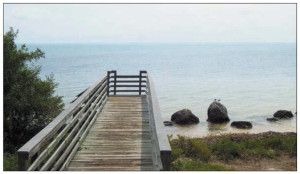
Want to brush up on your snorkeling skills or enjoy the beautiful Florida Keys’ waters without paying for a boat trip? You won’t see massive coral formations as shown on television, but you can find a wonderful and intriguing underwater world in the nearshore waters. At three area Florida State Parks, a quick swim will take you out to explore different marine habitats. While there are many places you can go for a dip in the Florida Keys, here are a few recommendations with directions to shoreline snorkeling spots.
At Indian Key Historic State Park, mile marker 78, you can find many creatures along the rocky shoreline and sandy bottom by snorkeling off the southwest side of the island. To get to this park, you must kayak or boat about a mile from Indian Key Fill. Once on the island, take the short trails to the warehouse ruins and access the water near the benches looking toward Tea Table. You can swim along the backside of the island from here and explore the many crevices along the rocky shoreline. Expect to spot many small fish and spiky urchins that eat algae off these rocks.
At Long Key State Park, mile marker 67.5, snorkelers can experience what marine biologists call a hard-bottom habitat. Here you will find a solid bottom with sponges, sea whips and small corals attached. These things might look like plants or rocks, but they are all living animals. Sponges make great homes for small colorful fish, urchins, crabs, eels, lobster, sea cucumbers, sea stars and numerous other marine creatures. Be sure to look underneath and inside holes of sponges to spot shy animals. To find the best snorkeling spots, swim about 200 yards offshore, parallel to the campground.
At Curry Hammock State Park, mile marker 56.2, seagrass beds dominate the nearshore waters. Park by the playground and walk down to the Atlantic Ocean. In the thick beds of turtle grass, colorful tunicates and large clumps of drift algae can often be found. You are also likely to spot small “bushes” of coralline algae about the size of your palm. This algae is made up of thin, white, hard branches that make most people mistake it for coral. Look carefully inside the many branches and find green porcelain crabs with hairy legs scuttling around.
Wherever you decide to snorkel in the Florida Keys, please remember marine plants and creatures are very sensitive and many are protected. The best policy is to take only pictures and leave only bubbles. Also, always follow Florida state law and display a dive flag while snorkeling outside a designated swimming area. To find more recommendations for snorkeling and other fun activities in the “Real Florida,” visit floridastateparks.org.
At Bahia Honda State Park snorkeling from the beaches is OK for beginners to learn the basics, but it is not satisfying for experienced snorkelers looking for a healthy reef with sea life.
Bay Side Beach
If you are going to beach snorkel here most folks do it from the bay side (the beach on the side of the park where the boat docks are – see the picture at right).
If you snorkel toward the bridge (to the left, facing the water) there are some rocks and a wall that is a home to some fish. The wall at the end of the beach is a popular spot for snorkelers to explore (see pic below). Take note though, there is a strong current that cruises through the channel under the bridge. So be cautious if you snorkel toward that channel from either side.
Atlantic Side Beach
Snorkeling Bahia Honda from the Atlantic Ocean side beach (pic below) tends to have more waves and is generally not much better. And actually if you snorkel anywhere but on the bay side, the park requires you to have a diving flag with you snorkeling, which they conveniently sell or rent from their store.
We sometimes do enjoy snorkeling in sea grass and rock environments because you get up close and personal with immature fish and a variety of other creatures you would not normally pay much attention to in a bigger coral reef environment. This time we found an occasional lobster in the grass, a couple of Spotted Scorpionfish, an immature Drum, and some small skates.
